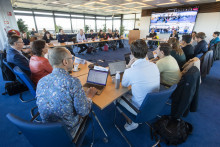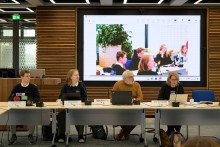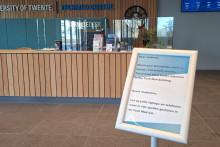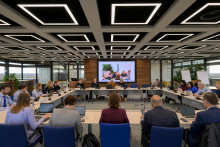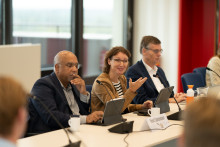University Council votes yes on new HR policy
The University Council consented on a new HR policy for the years 2023-2025. One could say ‘finally consented’, since the document has a long history. The council first discussed it with the Executive Board in June 2021, but decided to postpone it – since two new Executive Board members were about to start. The topic was supposed to be back on the agenda again last March, but the Executive Board withdrew it, because the Council didn’t intend to consent with the plan.
Today, the policy plan was on the agenda again. This time, the Council consented. ‘While the current document is still something we are quite critical of,’ Campus Coalition member Pieter Boerman introduced the topic. ‘Overall, we are not entirely satisfied.’
The University Council critiqued the new HR policy on several levels. ‘The question is: what kind of analysis do you make to produce this document? In our view, you analyse past plans and policies, you look at the current situation and then come up with solutions to deal with the problems you see. In this document, we see a lack of critical reflection on past performances and we see a lack of priority setting – for instance regarding work pressure and capacity management,’ said Boerman. ‘However, we do recognize the strategic direction that is being taken. That’s why we feel it’s important to give this a try.’
Will O&O square become bike-free?
When the terrain development plans for the new ITC building were on the table, the University Council had questions about the ‘bigger picture’, namely: what will this mean for the O&O square in general and the UT’s intentions to make the O&O square ‘bike-free’? Jaime de Bruin (UReka) asked a plethora of questions: ‘What would the Executive Board consider a bike-free zone? Are you also not allowed to walk there, while holding your bike? Which area are we considering? How big is it and will it also include the bike racks in front of the Ravelijn and Citadel? And: why make it bike-free? We’re a university, we have students. Students have bikes. Instead of blocking them, why not facilitate them?’
Executive Board vice-president Machteld Roos responded: ‘I think it’s better to rephrase this initiative as a sustainable bike parking plan. We’re still in an early phase with this plan and nothing is concluded yet.’ Roos did touch on reasons to look critically at the amount of bikes in the area. ‘The main question is: how do we support our students and staff in coming to work? We want to also keep our entrances reachable for emergency services and people with disabilities. And it’s also a matter of aesthetics and people’s behaviour. We’re open for every direction, but there is always going to be a trade-off, we have to be realistic with our expectations.’
The council and board came to the conclusion that the topic will again be discussed next May. In the meantime, Campus & Facility Management is working out the newly-coined sustainable bike parking plan.
Will Humanitarian Engineering cannibalize other programmes?
The University Council was generally positive about the plan for a new master's programme Humanitarian Engineering, which should begin at the UT in 2025. They were, however, concerned that the new inter-faculty programme might not attract new students towards engineering.
‘It’s important that the programme attracts new students that would otherwise not choose for an engineering programme at the UT. Otherwise it’ll cannibalize other programmes,’ said Tim Achterkamp (UReka). ‘That is not very efficient.’
‘Cannibalization of other studies is indeed an important point,’ responded rector Tom Veldkamp. ‘It needs to be clear what sets this programme apart from existing ones. We also don’t want to waste our energy and effort to just create another study. I personally think that it targets a specific domain that we don’t currently address at the UT. It is more global and more inclusive of the Global South. We will come back to this topic in a few months.’
Talent Development for scientific staff
The Council was presented with UT Policy Talent Development for Scientific Staff, a document based on the (national) Recognition & Rewards programme. At the basis of this program, the UT endorses the principle that every employee is a (potential) talent and should be able to develop in areas they choose. The policy is designed to address the different possible pathways for scientific staff at the UT.
The UC responded positively to the proposed policy, but suggested a few refinements. ‘Our main concern is the level of ownership from various stakeholders, such as HR and Young Academy,’ stated UC member Roberto Cruz Martinez. ‘Moreover, we noted that the youngest group of scientific staff such as doctoral candidates and PostDocs were not included at all in the current proposal. Finally, we’d like to see a similar policy for support staff.’
‘We are at the start of this process,’ said rector Veldkamp. ‘It will take about four years before the policy is fully implemented. This current policy is a base that we want to try and learn from. It’s important to emphasise that this is experimental. It’s not carved in stone. It’s an ongoing process and there will be a lot of finetuning and tweaks. It’s a big change. The policy will have its impact, for example on the UT’s position in rankings. The consequence of implementing this policy is that we drop further in rankings, but that is something we should be happy with. Every Dutch university has embraced the principles of Recognition & Rewards.’
Foundation for energy-efficient computing: Mission 10-X
On request of the S&T and EEMCS faculty, the UT is aiming to establish a new foundation together with the TU Eindhoven and the Radboud University Nijmegen. The university council gave a positive advice on the establishment of the foundation. Within this collaboration, called ‘Mission 10-X’, the universities want to radically reduce energy consumption in information technology by new ways of computing. The intended scientific director of this foundation is professor Hans Hilgenkamp.


